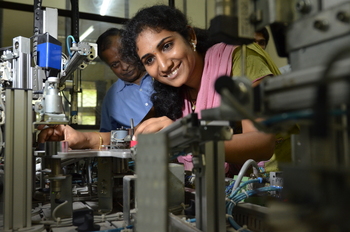Digital skills for the Asian labour market
Digital skills and human rights based values for success on the job market – DigitalSkills2Succeed
-
Commissioning Party
German Federal Ministry for Economic Cooperation and Development (BMZ)
-
Country
-
Overall term
2023 to 2025
-
Products and expertise
Economic development and employment
Context
Ongoing digitalisation in Asia is reshaping both daily life and the world of work. India, Bangladesh, and Viet Nam are dedicated to achieving comprehensive digital transformation and recognise the crucial need for a well-educated young workforce with digital skills to sustain their competitiveness.
Nonetheless, the existing training systems fail to adequately align with the demands of the labour market. Higher education institutions lack practical teaching methods and the inclusion of employment- and ethics-focused digital skills in their curricula. Ethical judgment, data protection, and responsible design principles for digital systems are being disregarded. Moreover, the untapped potential of microcredentials as a flexible learning format persists within university settings.

Objective
Study programmes designed to support young people’s digital skills relating to employment and ethics are improving in quality and quantity in selected regions of Asia.
Approach
The project aims to enhance the capacities of higher education institutions, fostering the sustainable implementation of improved study programmes. Central to this approach is the establishment of a higher education network, encompassing higher education institutions and research institutions in Bangladesh, Viet Nam, and India, as well as further international partner universities.
The network will bolster the qualitative and quantitative aspects of study programmes through the introduction of microcredentials. Lecturers and university managers receive training to enable the universities to develop and offer microcredentials independently. Through cooperation with the business community, the programme also furthers the alignment of qualifications with the needs of the labour market. The developed microcredentials thus promote future-oriented digital skills in line with regional labour market needs and national strategies.
Furthermore, the network will strengthen strategic and regional expert dialogue in order to ensure that study programmes are more ethically oriented by formulating recommendations for qualitative enhancements in dedicated regional conferences.

Last update: June 2023




